Quilter Cheviot has launched a Shariah-compliant discretionary investment service which will be managed by a team in the firm’s Jersey office.
The team will also utilise the expertise of their London research analysts and it will initially be focused to eligible clients in the Middle East and Africa via the firm’s Dubai International Financial Centre (DIFC) branch.
The service is available to private clients and institutional investors with $1m (£750,000, €890,000) of available capital.
Portfolios will consist of a range of global equities and can be held within a wide range of structures including trusts, companies, foundations, pensions and portfolio bonds.
Filtering
The investment team will work in collaboration with Shariah advisory firm Yasaar and its Shariah supervisory board to enable Quilter Cheviot to help clients construct a portfolio which meets their investment objectives, risk profile and time horizon while being Shariah-compliant.
Shariah is a system of values and rules that govern all aspects of Islamic life. Shariah principles dictate that companies involved in certain activities such as pork production, gambling and alcohol production will not be included in portfolios.
Similarly, after companies have been filtered out based on their business sector activity, there are other financial restrictions which will further steer the choice of investments available to the investment team.
Mark Leale, head of Quilter Cheviot DIFC branch, said: “At Quilter Cheviot, we feel that our new Shariah-compliant discretionary investment service is strongly correlated with our long track record of investing responsibly on behalf of our clients.
“We are very pleased to be able to promote this service to our clients in the Middle East and Africa who are looking to create bespoke portfolios based on their unique financial circumstances while remaining Shariah-compliant.”








